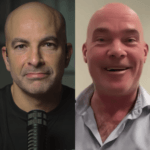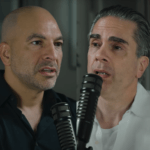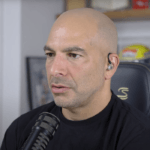In this “Ask Me Anything” (AMA) episode, Peter explains the various levers one can pull to affect longevity with a specific focus on the strategies and tactics one can implement that do not require the help of a physician. This episode heavily features insights into nutrition, exercise physiology, and sleep physiology. Once again, Bob Kaplan, Peter’s head of research, will be asking the questions. If you’re not a subscriber and listening on a podcast player, you’ll only be able to hear a preview of the AMA. If you’re a subscriber, you can now listen to this full episode on your private RSS feed or on our website at the AMA #12 show notes page. If you are not a subscriber, you can learn more about the subscriber benefits here.
AMA #12 Sneak Peak:
We discuss:
- The five levers you can pull to affect longevity [1:15];
- Nutritional biochemistry: Framework, 3 nutritional interventions, and how to approach your goals, and what you should be tracking [4:30];
- Exercise for brain health, and the 4 components of exercise [20:45];
- Exercise component—Stability [24:30];
- Exercise component—Strength [29:00];
- What is Peter optimizing for with his exercise? [30:30];
- Exercise components—Zone 2 and zone 5 training [33:15];
- More about DNS, and why we need to be careful with rushing kids through neuromuscular development stages [45:00];
- Sleep: How to improve quantity and quality [48:15]; and
- More.
The five levers you can pull to affect longevity [1:15]
- Nutritional biochemistry
- Exercise physiology
- Sleep physiology
- Distress tolerance
- Exogenous molecules (drugs, hormones, supplements … and maybe telomeres)
The podcast is going to focus today on things that one can do that specifically does not require the help of a physician
“The good news is you can do more on your own than you require the help of a physician for.”
Nutritional biochemistry: Framework, 3 nutritional interventions, and how to approach your goals, and what you should be tracking [4:30]
“Nutrition…might be the most complicated because I think it has the most variable response for a given individual to a given stimulus.”
Variation in individuals
- The same dietary program may work for one person and not for another…
{End of show notes preview}






A basic clarifying question: When training in zone 2, is it counterproductive to finish, say, a 60 minute session with a higher intensity segment (e.g., walking on a treadmill first at 130 bpm, then running for 15 minutes at 155 bpm — assuming a 165-170 maxHR). In other words, does one need to only work out in zone 2 to get the full benefit or can one switch modes in the same session.
Increasing running intensity towards the end is referred to as a progression run and is used by running coaches to develop speed and endurance before introducing specific speed workouts. These should be used sparingly and only on your longer runs maybe once every two weeks.
I’m not sure what Peter would say and without looking at the literature I can’t be sure but I do know if you activate the AMPK pathway and then move to something that stimulates mTOR that basically takes over. So I’m guessing if you are looking to maximise the chances of AMPK stimulation then it could potentially be counter productive.
I remain interested in knowing the names of any physicians in my city of Birmingham, Alabama on board or in line with Peter Attia’s approach(es).
I understand that a related list might be released by Peter Attia’s group sometime this summer.
Any luck, Bill? Also located in Birmingham with the same mission.
Peter,
Thanks for another great podcast. The part about not needing a physician is particularly useful because so often, primary care docs are not in tune to this information and it is easy for the patient get so obsessed about trying to get lab work that they miss the forest for the trees. Although, as a dietitian who loves lab work, another podcast about your most recommended labs (with your views on optimal ranges) would be most useful. Thanks
Hi Peter, This was a great AMA, Thank you!. Can you share the vegetables you take while you are on a low carb regimen?
I try to make a smoothie with green leafy vegetables and some berries nuts, flaxseed, chia seeds etc and a scoop of protein powder. I feel like this is too much carbs. I was wondering if he can share your low carb vegetables options you take?
Thank you,
VERY helpful episode!! More please… 🙂
Hey Peter, I love the podcast and your show notes! As a doctor who is helping patients manage the causes of their health issues through lifestyle and through adaptive physiology rather than symptom/disease management, I find your podcast and everything about what you teach super helpful and relevant. Keep up the great work and thank you for the countless hours you put in, it is making a big difference in so many lives. And I have the results with my patients to back it up!
Dr. Dane Donohue
Hi Peter, love the show. You’ve mentioned magnesium L-threonate a number of times in the context of promoting sleep. I’m wondering what you base this on? There seems to be very little evidence out there, at least that I can see on the web. Is this something you’ve discussed with Mathew Walker? I can’t find any reference to it in the show notes from those episodes with him…. Also the link in the show notes from episode #89 (where you also briefly mention magnesium L-threonate), references an NCI Drug Dictionary entry on this compound, but sleep is not mentioned there at all… I’d certainly appreciate further discussion on this compound and links to research if they are available!
Hi Aaron,
There is no evidence on MgT for sleep specifically. There are some studies showing that Mg supplementation improving sleep, mostly in the elderly:
https://www.researchgate.net/publication/11222762_Oral_Mg2_Supplementation_Reverses_Age-Related_Neuroendocrine_and_Sleep_EEG_Changes_in_Humans
https://pdfs.semanticscholar.org/d3e2/31c5d5fd4983766865c3dac729d388f0a6c3.pdf
https://www.ncbi.nlm.nih.gov/pubmed/21199787
The advantage of MgT is that (as shown in rodent studies) it is far more effective in crossing the blood-brain barrier than other forms of magnesium. You would EXPECT this to make it better for sleep.
I do take MgT; I’m not sure if it helps improve my sleep or not. For what it’s worth, the only time I took a dose shortly before bed, it was at least ASSOCIATED with a state of alertness (which I normally get when I take it consistently during the day) which delayed my sleep onset for much longer than is normal for me.
Regarding the section on Sleep (as well as all of the Matthew Walker podcasts) you provide a general recommendation of 7 to 8 hours of sleep. As I have grown older (now 57) I find I can no longer achieve this sleep duration (typical is 6.5 hrs). I have seen/read several discussions that it is normal to have reduced sleep and more fragmented sleep as you age – that this is normal – even Matthew Walker stated this. – What evidence is there that this is normal or at least not detrimental to health as we age? With regard to healthspan (and lifespan) shouldn’t this be an important topic to understand better?
Matthew Walker’s “Why We Sleep” Is Riddled with Scientific and Factual Errors
https://guzey.com/books/why-we-sleep/
Really good find — thanks, John!
Peter, I’d really like to have you broadcast this to your listeners — and maybe invite Dr. Walker on to discuss these points with him. Many of them seem to be pretty darned damning.
Randy? Hey!
I have a question with regards to Zone 2 exercise.
I can maintain Zone 2 by either a fast walk or a slow jog (approx 11min per km).
Do you think there is any benefit of one over the other?
Thank you to all who help make this amazing content possible! I work in chronic pain and longevity enhancement spaces; I like the idea on another episode diving deeper!
VERY helpful episode!! More please.
Haha, agree with you, we are waiting 🙂
Is the Wim Hof (Iceman) method something Peter would try and could have benefits on lingevity? Is it dangerous?
hi
i wanted to join the conversation on podcast 92; ama#12
i found ot to be very helpful and informative and so was disappointed that peter never addressed two of the 5 levers he identified which we “can pull to effect longevity”:
Distress tolerance
Exogenous molecules (drugs, hormones, supplements … and maybe telomeres)
an oversight? any comments on these ?
thanks
sid segal
Super helpful having the “what you can do without a physician” occasionally. Give more actionable stuff for people who can’t access an enlightened medical system
I would like to thank Peter for providing this actionable information – most helpful. If possible, it would be very helpful to have a detailed explanation of his strength training routine (warmup, specific exercises, sets, rest between sets, etc.
These are great tips. I like that your strategies for longevity are focused on complete wellness and not just preventing wrinkles. Living a long time is only great if you are in good shape.
I am curious to why you say you eat “basically whatever you want”, then say you are severely restricting carbohydrates.
That’s a total contradiction and does not make sense.
Love this episode. Vote yes to a 2nd AMA covering addl. info 🖤
Waited for a list to be released by Peter Attia’s group, did not find it yet(
I got a lactate meter today, 124 HR was 4.1 – I heard zone 2 was boring but jeez